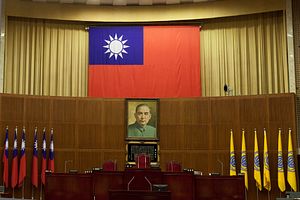The Chinese Communist Party (CCP)’s 19th National Congress is scheduled to open on October 18.
Recently, a Taiwan-born academic was found having been elected as one of the around 2,300 delegates to attend the National Congress. As tensions in cross-strait relations keep increasing, the news immediately caught attention across the Taiwan Strait and triggered a debate in Taiwan: Is it legal for a Taiwanese to be the delegate of China’s Party Congress?
Taiwan’s Economic Daily News uncovered on October 4 that Lu Li’an, a Taiwanese academic born in Kaohsiung (a port city in southern Taiwan) has been elected as one delegate in Shanghai to attend the upcoming party congress.
In fact, it’s a tradition for the Chinese government to have delegates represent the “Taiwan Province” in various important national meetings. In the 18th Party Congress, for example, there were also ten Taiwanese delegates. What’s different this time is that Lu was originally born in Taiwan, while in the past, most “Taiwanese delegates” were born in the mainland.
According to Economic Daily News, Lu, 49, studied English literature at National Chengchi University in Taipei before she moved to the United Kingdom in 1990, earning a doctorate in English literature at the University of Glasgow. While in the United Kingdom, she met her husband – who was born in the mainland but is ethnic Taiwanese – and the pair moved to Shanghai in 1997 and have been teaching at Fudan University since then. Lu currently holds the position of deputy dean of Fudan University’s College of Foreign Languages and Literature. She is also politically active and has been working on multiple political positions in Shanghai.
After the news triggered controversy, Taiwan’s Mainland Affairs Council announced that it has launched an investigation on Lu to see if she has violated the Act Governing Relations Between the People of the Taiwan Area and the Mainland Area, issued in 1992. The Act prohibits the Taiwanese from establishing a residence or holding a Chinese passport; nor can Taiwanese assumes positions in the CCP, the People’s Liberation Army, or the Chinese civil service, under the Act.
Katharine Chang, the minister of Mainland Affairs Council, said on October 5 that the council has discovered Lu, although born in Kaohsiung, has already acquired a Chinese passport.
“The council respects Lu’s choice to enter and leave Taiwan with her Chinese passport,” Chang said, but the Taiwan’s National Immigration Agency is investigating whether Lu still holds her Republic of China (ROC) citizenship. “If Lu is found has her ROC citizenship, she would be expected to choose between ROC or Chinese citizenship,” Chang add.
Chang’s remarks on Lu actually also touched upon a trick problem for many Taiwanese living and working in the mainland: is it OK for Taiwanese to hold dual passports both in Taiwan and in the Chinese mainland? Technically speaking, neither side allows their citizens to hold dual passports across the straits. However, under the previous administration of Ma Ying-jeou, when the cross-strait relations were considerably good relatively speaking, the governments on both sides tended to turn a blind eye to the problem.
Thus, many Taiwanese in practice have attained citizenship in China. In addition, a large number of couples married across the Strait and had offspring. Now, the legal status of these cross-strait babies is also likely become an issue.

































